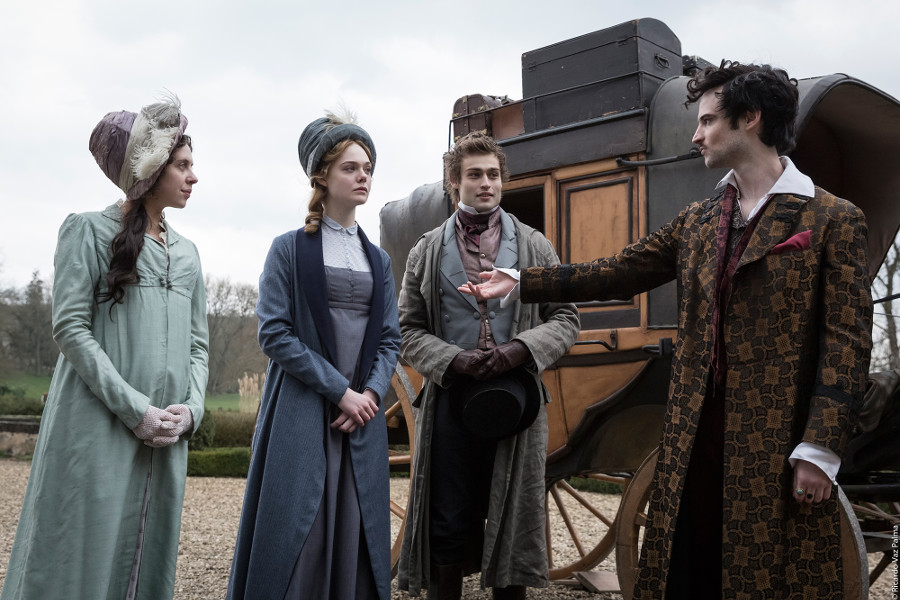When Mary Shelley started work on the short story that would become Frankenstein; or, The Modern Prometheus, her intention was to create tale that would chill and entertain her friends and family. Over time it would transform into the work we celebrate today: a horrific but touching story about a pitiful, ugly creature, unable to find affection or companionship in a world that has declared it a monster.
Mary was only 18 years of age when she wrote Frankenstein, but a life full of tragedy and adventure inspired both the intelligence and the maturity required to pen such a seminal piece of literature. No wonder then that, 200 years after the novel was originally published, her remarkable life should be turned into a biopic.
Unfortunately, the team behind Mary Shelley frequently opts to diminish the complexity of its titular character, instead relying on a more conventional perspective to tell a far less interesting story.
The film introduces us to 15 year-old Mary (Elle Fanning) as she reads by the grave of her mother, philosopher and feminist Mary Woolstonecraft. Woolstonecraft died less than a fortnight after Mary’s birth, and her father, himself a philosopher, has since remarried. Relationships are strained at home as a result, so Mary is sent to further her education in Scotland.
Here she meets the esteemed poet Percy Bysshe Shelley (Douglas Booth), and they fall in love at first sight. When Mary is called home, Percy soon follows, under the pretext of seeking mentorship from her father.
Their affair flourishes in secret, but soon rumours make their way through town, culminating in Mary being confronted by Percy’s wife and child – both of whom she did not know exist.
Their relationship revealed, Mary decides to run away with Percy, bringing her stepsister Claire (Bel Powley) along. The decision mars both families in controversy, and Mary quickly comes to realise living a life solely defined by love will not be as simple as she first envisioned.

From here the film carries along from one event to the next, with no real impact. In one scene, Mary’s father is warning her that eloping with Percy will result in her being disowned. The next, he’s telling her to live the life she desires. Soon after, Percy announces he has run out of money. 20 seconds (in screen time) later, he, Mary, and Claire are living in a lavish house with servants.
These situations are not too dissimilar from what Mary actually experienced, but the reality of each is distorted to ensure there’s none of the moral ambiguity that made its hero such a fascinating figure. It’s not unusual for biopics to skew details to fit a narrative structure, but in their effort to tell the story of a woman’s oppression, writer Emma Jensen and writer/director Haiffa Al-Mansour make changes that result in sequences that sometimes feel corny, and at other times flat.
It’s a far cry from Al-Mansour’s previous film, 2013’s incredible Wadjda. Both movies deal with a common concept – a girl defies cultural traditions to pursue her passion – but where Wadjda is provocative, Mary Shelley is cautious.
This caution carries into the film’s performances. Fanning is a strong actor, but her Mary embodies far less fire and passion than she claims. In contrast, Booth’s Percy struts like a Georgian era peacock that’s caught a glimpse of itself in the mirror. There’s no subtlety, and due to the script, little depth. His flamboyant wardrobe, however, is one of the highlights of the film, as is the simple but charming production design.
After a series of utterly transparent experiences hinting at the genesis of Mary’s idea for Frankenstein, the film starts to pick up as she, Percy, and Claire visit the latter’s lover, the esteemed poet Lord Byron, at his home. It is perhaps here that the Mary Shelley should have started, for it is the moment most viewers will purchase a ticket to see, and it comes too late.
There is a wonderful story yet to be told about Mary Shelley. One which recognises that her eccentricities, her unconventional relationship with Shelley, and the challenges she faced on her path to greatness, are what makes her the icon of women’s liberation and excellence that the film so desperately wants us to see her as.
Mary Shelley could have been that story, but instead feels like a squandered opportunity.
—
Mary Shelley releases in cinemas July 5th.
